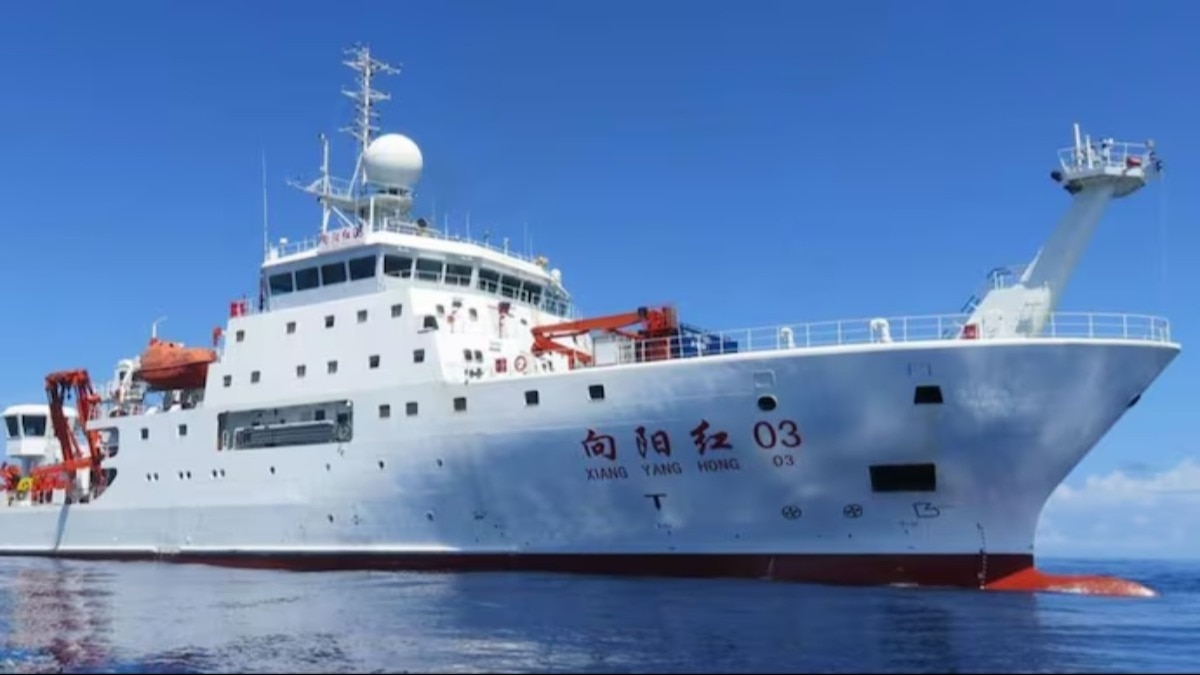2024-03-22 18:33:52
As India gets ready to hold missile testing operations, two Chinese spy vessels are reportedly cruising in its backyard, raising questions about their intentions and destinations. This comes after Sri Lanka revealed it amended its previous stance on research vessels to allow them for replenishment. Given Prime Minister Narendra Modi’s request to the Sri Lankan President to consider India’s security concerns, it’ll be intriguing to observe whether the Chinese surveillance ships halt at Colombo.
Sri Lanka recently also authorised a German research vessel to make a port call in Colombo for replenishment. The move drew criticism from China, highlighting Colombo’s staggered stance after the country turned down Beijing’s request to dock a research vessel, Xiang Yong Hong 03.
Open-source maritime tracking data reveals that there are not one but at least four Chinese research ships meandering in the Indian Ocean. India Today’s OSINT team tracked the movement of the spy ships ahead of India’s scheduled missile launch tests in the Bay of Bengal.
Previously, India cancelled a Notice to Air Missions (NOTAM), signalling the deactivation of a scheduled March 13 missile test over the Bay of Bengal. The area covered by the NOTAM spans 3,550 kilometres, leading experts to conjecture that the test might have involved K-4 submarine-launched ballistic missiles. Although the official reason for the postponement of the missile test has not been disclosed, there is speculation that spy ships are trying to monitor India’s missile test operations.
Subsequently, two new NOTAMs were issued, covering the period from March 26 to 28 and April 3 and 4, for air exercises within a range of 380 kilometres and 1,680 kilometres near the coast of Bhuvaneshwar and Abdul Kalam Island. People’s Liberation Army vessels are notorious for picking up acoustic signatures of submarines as well as peek into the test firing of missiles off the Integrated Test Range at Abdul Kalam island in an attempt to link the coordinates with Chinese spy satellites.
Yuan Hong 03, last reported near Jakarta Island in Indonesia as per maritime data, initiated its journey from Kinmen Island on March 15. Earlier, Xiang Hong 03 was also reported snooping into India’s defence activities right in the time of India’s test launch of Agni-5 missile with Multiple Independently Targetable Re-entry Vehicle technology. After Sri Lanka refused the vessel permission for a replenishment stop, the Maldives, under its new pro-China government, granted the ship clearance for an operational turnaround.
In addition, Xiang Hong 01 is persistently active in the Indian Ocean region, steering near Sri Lanka’s coast. The ship meandered close to Vishakhapatnam off India’s Eastern seaboard coinciding with India’s declaration of a flight restriction zone over the Bay of Bengal. Consequently, the NOTAM for the missile testing was cancelled.
There is widespread speculation that Yuan Hong 03 and Xiang Hong 01 will be making a port call at Colombo after Sri Lanka lifted its moratorium on research vessels this Wednesday. However, there has been no official confirmation on this as yet. Maritime data shows its listed destination as “Open Sea”. Given the upcoming NOTAM set for March 26 and April 3, it would be interesting to see if the ships actually halt at Colombo for operational turnaround before potentially moving close to the eastern board in time for the scheduled missile launch.
The stated objectives of these vessels include conducting hydrography and hydrological surveys to support future PLA submarine operations in the Indian Ocean region. However, the presence of Chinese surveillance vessels off India’s eastern board may also serve to monitor missile tests conducted from the Balasore test range. Additionally, these vessels could be tasked with gathering intelligence on the signatures of Indian nuclear ballistic missile submarines stationed near Visakhapatnam.
Sri Lanka is in the process of crafting a standard operating procedure to deal with research vessels, as per Delhi-based maritime security analyst Pooja Bhatt. “The Sri Lankan SOP primarily addresses the protocols for foreign research ships. Typically, countries do not deny replenishment requests from foreign vessels. It lies in the grey area of diplomatic relations when a research vessel seeks replenishment. Sri Lanka’s decision to permit the German research ship’s replenishment as falling within these customary practices” she told India Today.
“Of course, with a new NOTAM of 380 kilometres, there are high chances of another surface-to-air missile test that falls within the range in the coming days in the Bay of Bengal area. We closely monitor for how long the Chinese ship is in the region,” she added.
Since 2019, India has consistently witnessed such Chinese spy ships a.k.a research vessels near its coastline coinciding with India’s missile testing operations. Ships including Yuan Wang 6, Yuan Wang 5, Shi Yan 6, Xiang Yang Hong 03, and Xiang Yang Hong 01 have in the past been speculated to be monitoring Indian defence activities closely.
Two additional Chinese research vessels, Da Yang Hao and Xiang Yang Hong 03, equipped with advanced research technology, are currently active in the Indian Ocean region.
WHY SRI LANKA IS LETTING FOREIGN ‘RESEARCH’ SHIPS TO DOCK
Economy Next, a Sri Lankan news website, quoted the country’s Foreign Ministry spokesperson Niluka Kadurugamuwa saying: “The ban on foreign ships is for research purposes, not on replenishment.”
In January, Sri Lanka declared a prohibition on Chinese vessels entering its waters for a year. This decision was likely influenced by a request from Prime Minister Narendra Modi to President Ranil Wickremesinghe, urging him to consider India’s security concerns, which they discussed in a July 2023 meeting. The Sri Lankan government’s announcement of the year-long ban came after both India and the United States expressed apprehensions about Sri Lanka’s engagements with Chinese vessels within its maritime territories.
China is also the largest investor in Sri Lanka today, with funding and investment of nearly $15 billion. Most recently, Sri Lanka approved Chinese state-owned oil giant Sinopec’s proposal to build a $4.5 billion refinery in the southern port of Hambantota, the single largest investment in Sri Lanka since the economic crisis of 2022.
In October 2023, the Chinese research ship Shi Yan 6 arrived in Sri Lanka, docking at Colombo port for what was described by Beijing as “geophysical scientific research” in partnership with Sri Lanka’s National Aquatic Resources Research and Development Agency. Previously, in August 2022, the Chinese navy vessel Yuan Wang 5 made a stop at Hambantota in southern Sri Lanka for replenishment purposes.
Both instances prompted strong objections from India, which raised security concerns over these developments in the Indian Ocean. New Delhi harboured worries that the tracking systems aboard the Chinese vessels might be used to gather intelligence on Indian defence establishments.
Following Sri Lanka’s authorisation for a German research vessel earlier this month, the Chinese Embassy in Colombo lodged a strong protest. Given the geopolitical tensions, it will be intriguing to observe whether the Chinese surveillance ship indeed halts at Colombo.
“The strategic importance of the Bay of Bengal within the broader Indo-Pacific region is transforming it into a focal point for geopolitical manoeuvring. The passage of the Chinese ship Xiang Yang Hong 01 through these waters to the Sri Lankan Exclusive Economic Zone, despite recent prohibitions, highlights a shift,” Foreign policy analyst Sohini Nayak told India Today.
She explained, “Though matters like this should not garner an overt posture on India’s part, we must acknowledge the reality of China’s Look South Policy and remain assertively cognisant of its evolving nature with a policy of hedging and further balancing our neighbourhood diplomacy, keeping national interests at the forefront.”
indian ocean, chinese ship, sri lanka, colombo port, Hambantota, maritime security, chinese research ship
Source link
![]()



